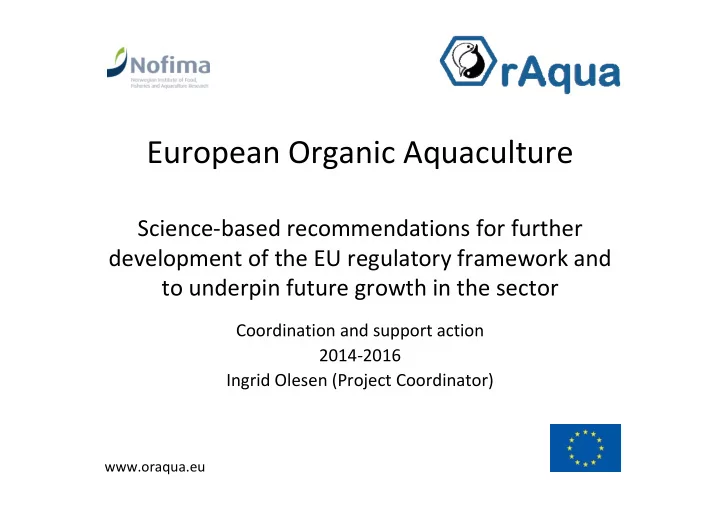

European Organic Aquaculture Science ‐ based recommendations for further development of the EU regulatory framework and to underpin future growth in the sector Coordination and support action 2014 ‐ 2016 Ingrid Olesen (Project Coordinator) www.oraqua.eu
Overall vision Economic growth of the organic aquaculture sector in Europe, supported by science based regulations in line with the organic principles and consumer confidence
OrAqua will • suggest improvements for the current EU regulatory framework for organic aquaculture based on a review of the relevant available scientific knowledge on organic aquaculture production, economics and consumer perceptions of organic aquaculture • focus on aquaculture production of relevant European species of finfish, molluscs, crustaceans and seaweed
Partners 1. Nofima 2. COISPA Tecnologia & Ricerca, Italy 3. DTU – Technical University of Denmark, Denmark 4. Ifremer – French Research Institute for Exploitation of the Sea, France 5. USB – University of South Bohemia in Ceské Budejovice, Czech Republik 6. SLU – Swedish University of Agricultural Sciences, Sweden 7. DLO – Stichting Dienst Landbowkundig Onderzoed, Netherlands 8. Debio Association, Norway 9. ICEA – Istituto per la Certificazione Etica ed Ambientale, Italy 10. ICROFS – International Centre for Research in Organic Food Systems, Denmark 11. FEAP – Federation of European Aquaculture Producers, France 12. IZSVe – Istituto Zooprofilattico Spreimentale delle Venezie, Italy 13. Culmarex SA, Spain
Structure of work, mechanisms (green) and knowledge flow (blue) in OrAqua Tools Reviewing of Expert working groups, Production issues and Social aspects workshops, Desk studies, 1. stakeholder Web surveys event (M11) Dissemination Stakeholder Integration and platform Communication of Website Facilitation Reviewing Results 2. stakeholder techniques event (M24) Stakeholder Input MCDA and Feedback Consensus SWOT event (M33) Recommendations
Organisation of work packages
Gantt chart showing timing of activities Year 1 Year 2 Year 3 Activity M1 M2 M3 M4 M5 M6 M7 M8 M9 M10 M11 M12 M13 M14 M15 M16 M17 M18 M19 M20 M21 M22 M23 M24 M25 M26 M27 M28 M29 M30 M31 M32 M33 M34 M35 M36 WP1. OrAqua multi stakeholder platform and dissemination 1 WP2. Review of production related issues in organic aquaculture WP3. Review of new and existing knowledge on socio ‐ economic issues related to organic aquaculture WP4. Integration and communication of results 2 WP5. Process Facilitation ‐ Design and delivery of effective processes for stakeholder events WP6. Recommendations 3 WP7. Project management Multi Stakeholder Events 1 2 3
WP1 OrAqua multi stakeholder platform and dissemination ‐ Overall aims (1) To coordinate and facilitate the consultation with relevant stakeholders ‐ planning of the 3 stakeholder meetings, ‐ to collect and analyse the stakeholder feedbacks ‐ to validate the project results (2) To disseminate the project results towards ‐ aquaculture industry, ‐ policy makers, ‐ consumers, ‐ NGOs through the OrAqua website and printed documents
Multi-stakeholder platform Follow OrAqua at www.oraqua.eu
WP2 Review of production issues Overall aim in short • To review scientific knowledge on production issues in organic farming focusing particularly on • fish feed and nutrition, • health and welfare, veterinary treatments and biosecurity, • production systems and management, • environmental interactions
WP3 Review of socio ‐ economic issues Objectives We will collect and review available information related to organic aquaculture to: 3.1. Assess consumer perceptions, sentiments and understanding of organic aquaculture to promote consumer confidence and acceptance of organic farming principles. 3.2. Improve understanding of the economics of organic aquaculture production and the competitive position of organic aquaculture products in EU markets 3.3. Explore critical development constraints and potential improvement in the institutional systems , to provide input to regulatory bodies for an increased organic aquaculture production 3.4. Identify socio ‐ economic issues/bottlenecks that need to be addressed for successful implementation of organic aquaculture 12
WP4 Integration and internal communication of results ‐ Objectives: Analyse and integrate outputs from WPs 1, 2, 3 and 5 Identify: Objectives – Criteria ‐ Options – Priorities MCDA (1st event) Transform the information into readily accessible format for WP 1 Prepare MCDA survey WP 5 (2nd event) MCDA WP 6 (SWOT – Recommandations)
WP 5 Facilitation of stakeholder events Organize three stakeholder events to engage stakeholders, facilitate the communication between participants, enable collaborative learning, and to develop outcomes that feeds into the other processes
WP6 Recommendations Overall objectives 1. Assess the relevance, measurability and applicability of the main achieved results to the organic aquaculture EU regulation 2. Generate sound science based recommendations for potential updates of the regulation, which reflect the holistic perspective of the project 3. Facilitate a large diffusion of the recommendations among stakeholders 4. Produce executive dossiers on the main technical background behind the recommendations according to the standard/template used by EGTOP 5. To realize a Policy Implementation Plan (PIP)
Three Stakeholder Events Events designed to build strong relations, a shared understanding, and a communicative culture within the project. Event 1 ‐ supporting the processes of reviewing (WP2 and 3) and • integration (WP4) with stakeholders interests and experiences – Preconference at Ifoam Organic World Congress in Istanbul October 11 ‐ 12, 2014 Event 2 ‐ survey stakeholders values, attitudes and prioritize, and • to initiate the decision making process generated by MCDA (WP4) – Conference at EAS meeting in Rotterdam in October 2015? Event 3 ‐ building consensus on recommendations (WP6) – • Brussels July 2016
Objectives of this first Stakeholder Event • Initiate the interaction between the project partners and the key stakeholders in the field of organic aquaculture • Validate results of reviewing and make sure that all important issues and aspects are taken into consideration and covered by the project • Engagement of all participants to ensure iterative development of whole project
Thank you for the attention Funding from the EU FP7 by the OrAqua project N°613547 is acknowledged Follow OrAqua at www.oraqua.eu
Recommend
More recommend